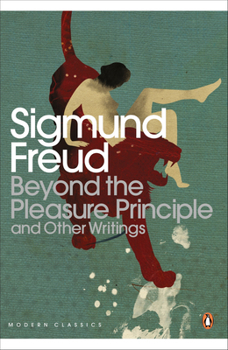Modern Classics Beyond the Pleasure Principle: And Other Writings
In what is considered a turning point in his theoretical approach, Austrian psychiatrist, Sigmund Freud outlines core psychoanalytic concepts, including libido, wish fulfillment, and repression. He... This description may be from another edition of this product.
Format:Paperback
Language:English
ISBN:0141184051
ISBN13:9780141184050
Release Date:July 2003
Publisher:Penguin Group
Length:496 Pages
Weight:0.55 lbs.
Dimensions:0.7" x 5.2" x 7.8"
Customer Reviews
5 ratings
Compulsion to Repeat
Published by Thriftbooks.com User , 15 years ago
Essentially explains why many of us repeat destructive behaviors over and over. This is a short book, but anything but a "quick read". Unless you were a psych major it's gonna be tough going. But definitely worth the time. Of course Freud was one of the greatest thinkers of the 20th century. Surprisingly, recommended for Day Traders, of which I am one.
Brilliant
Published by Thriftbooks.com User , 17 years ago
This little book is indubitable proof of the breadth and depth of Freud's thinking. It is a fascinating and multi-faceted read, containing elements of psychoanalysis, philosophy, poetry, biology, and the literary theory. You will not believe how quickly Freud is able to move from topic to topic and the absurd range within which he is able to speculate. This is also an extraordinarily challenging read, it requires patience and many re-readings. Freud discusses the compulsion to repeat, transference neurosis, life and death drives, and a number of other cognitive and behavioral topics.Here is a curious quote I adore: "In the last resort, what has left its mark on the development of organisms must be the history of the earth we live in and its relation to the sun" (pg. 45). Beyond the Pleasure Principle is a seminal component of his expansive corpus, and should be standard reading for psychologists.
Happy, Deadly, Wild Psychology!
Published by Thriftbooks.com User , 23 years ago
Sigmund Freud's "Beyond the Pleasure Principle" is a key text, not only for psychologists, or literary theorists, but anyone who thinks about why our minds work the way they do. If your mind is open to extreme possibilities, give this text a read. It is short, barely 75 pages, but give yourself time to pore over and make notes, as Freud moves very quickly.In "Beyond the Pleasure Principle," Freud seeks to discover the causes and effects of our drives. To this end, he begins with the pleasure principle, which basically holds that the job of our 'mental apparatus' is to lower tension and move us towards pleasure and stability. Working against the pleasure principle are our baser instincts, which must be repressed by a vigilant brain. The pleasure principle can also be interrupted by the reality principle, which operates in moments when basic life functions are threatened - to wit, when maintaining life is more important than pleasure. Examining the pleasure principle, Freud looks at scenarios which may shed light on mental processes that seem to challenge it. These include repetition compulsion, wherein adults seem to fixate and reenact moments of trauma. Seeking a more primal cause for repetition instinct, Freud analyses children's games. Interestingly, the further Freud regresses, the more speculative and intense he gets - from childhood, Freud talks about the brain itself, moving back to simple multicellular organisms, unicellular organisms, and ultimately inorganic matter - all the time looking for an explanation of the origin of instincts themselves.Freud's queries on instinct and repetition compulsion lead him to the darkest possible places - the revelation of the death instinct. Freud posits that the repetition compulsion manifests itself in all conscious beings in the desire to return to the earliest state, total inactivity. The remainder of his treatise is spent developing the conditions of the death instinct, and trying to find a way out of this shocking thesis. Taking up Hesiodic Eros as symbolic of the life instinct, Freud attempts to argue out of the seemingly inescapable conclusion.Freud's writing style is direct and fluid, but not necessarily straightforward. If you're not paying attention, Freud can go over your head quickly. For example, on page 50 of this standard edition, his line of argument dismisses Darwin, Marx, and Nietzsche in a matter of two paragraphs to astounding effect. His language is highly figurative, drawing on philosophy, literature, biology, and anecdote to make and illustrate his points. A critical text for anyone interested in psychoanalysis and its figurehead author.
a classic not for beginners....
Published by Thriftbooks.com User , 23 years ago
....but a daring example of the willingness of a thinker to make fundamental changes to his theoretical framework very late in his career. This is where Freud shifts his emphasis from ego vs. id instincts to the famous Eros/death polarity, clinically questionable but archetypally informative.
Beyound Psycho-analysim
Published by Thriftbooks.com User , 24 years ago
Freud did a remarkable job of reinstateing, and clearifying exsisting established beliefs, In this his finale publishcation. Although it is a bit wordy on occassions, a even a bit (dare i say) nonsenseacal. It is a enlightning and fasanating piece of work. And though I would'nt recommend it for new-comers to the world of psyco-analysim, it is diffently worth reading.





